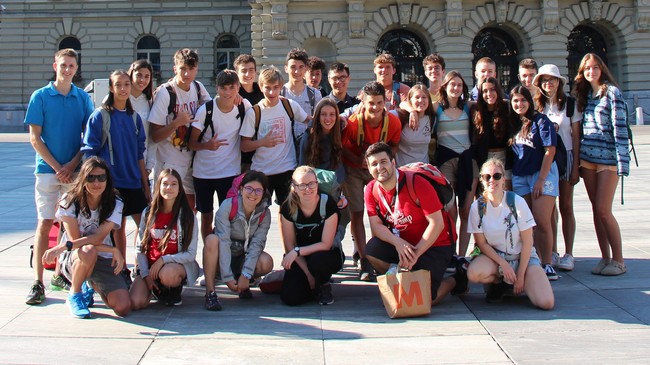
When Russian state TV re-interprets a Swiss documentary

Russian state television has broadcast footage – shortened, falsified, and misused – made by its Swiss counterpart, SRF. Journalists say this is par for the course in Putin’s Russia.
Recently, SRF’s special correspondent – and its former Russia correspondent – Christof Franzen was unexpectedly seen flickering across Russian television screens as a protagonist on the state TV.
According to the moderator, Franzen had travelled to Russia to show that everyone in the country was “barbaric, stupid, and drunk”. However, he met only “friendly, hardworking, and above all patriotic people”, the moderator continues, depicting Franzen’s documentary as the story of a prejudiced reporter managing to learn about the real Russia.
Critical reporting
In reality, Franzen’s goal in the two “ReporterExternal link” documentary films was to ask people in Russia what they thought about the war in Ukraine, two years after it began. In Siberia for example he spoke with women about their grandsons at the front; he also reported on war-weary remarks which he heard off-camera.
His films clearly show that there are people in Russia critical of the war. “I’d like there to be less indifference here,” one woman said. “I would like humans to be at the centre. Not like now: we send people to war, to be slaughtered, and who kill others in turn.”
No room for nuance
The SRF journalist also met people who spoke positively about the war. “Russia, Ukraine and Belarus are all one nation – we were divided,” one man told him. However, in its footage, Russian state TV honed in exclusively on such statements.
Franzen learned about his appearance on Russian state television via acquaintances in the country. “The nuance, my critical comments, and to some extent critical questions are missing. They cut all that out,” Franzen says.
David Nauer, SRF’s current correspondent for Russia and Ukraine, is not surprised about this. “Russian authorities follow Western media closely,” he says. This task is apparently mainly done by embassies. So, for example, the Russian embassy in Bern reads Swiss newspapers or watches SRF. “When diplomats see something that strikes them, it’s sent to Moscow, and in some cases exploited for propaganda purposes,” Nauer says.
Seeking Western approval
It’s also striking how much effort state media in Russia puts into preparing footage made by a Swiss filmmaker – and how it gave him prime-time coverage. Despite the rivalry, it’s not unimportant to Russia what the West – and Swiss television – thinks, says Ulrich Schmid, a professor of East European Studies at the University of St Gallen. On one hand, Russian TV likes to present the West as the enemy: “at the same time, Russia is always on the lookout for Western approval”.
Western figures are useful for propaganda purposes. Recently, an interview of Vladimir Putin by conservative US journalist Tucker Carlson was exploited in the Russian media. Franzen’s visit to Russia was meanwhile retold in such a way to fit into the Kremlin’s narrative. It’s an exemplary case of how Russian propaganda works, Nauer says. “It’s not simply that reality is polished; a veritable new reality is invented”.

Upcoming vote
Russian TV also suggested that, as presidential elections loom, all those interviewed by Franzen were in favour of Putin’s rule. Even the Swiss journalist himself understands this, the report said.
Schmid says this is again part of the Russian efforts to secure external validation for internal policy. The conflict in Ukraine is unpopular among the Russian population, he says. “Many want the war to end, and so when a Swiss TV programme comes to the same conclusions as Russian propaganda, it supports Putin’s position.”
Precisely because the regime is not democratically legitimised, it has to find a way to justify its decisions. A Swiss journalist who finds only enthusiasm for war in the country helps this strategy.

In compliance with the JTI standards
More: SWI swissinfo.ch certified by the Journalism Trust Initiative
















![The four-metre-long painting "Sonntag der Bergbauern" [Sunday of the Mountain Farmers, 1923-24/26] had to be removed by a crane from the German Chancellery in Berlin for the exhibition in Bern.](https://www.swissinfo.ch/content/wp-content/uploads/sites/13/2025/12/01_Pressebild_KirchnerxKirchner.jpg?ver=cb688ed5)














You can find an overview of ongoing debates with our journalists here . Please join us!
If you want to start a conversation about a topic raised in this article or want to report factual errors, email us at english@swissinfo.ch.